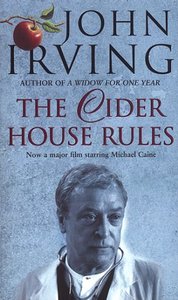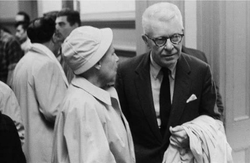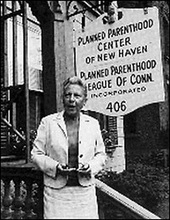"These same people who tell us we must defend the unborn are the same people who seem not so interested after the accident of birth is complete."
"He believes a fetus has a soul, does he?... better he should take care of the souls who can talk back to him."
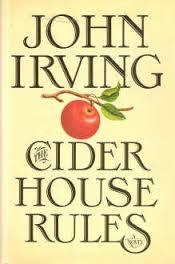
Those were the "incisions" of Dr. Wilbur Larch, the chief medical officer and CEO of the orphanage in St. Cloud's, Maine.
May 1985: Dr. Larch's moral gestations - his labors on behalf of women pregnant with "unwanted babies" or the "products of conception" (in the initial months) - were delivered to the public by John Irving in his 1985 novel The Cider House Rules. Irving's grandfather, an obstetrician, provided recollections and medical books that aided in the conception.
Delivering choice
As an obstetrician, Dr. Larch delivered babies; "as an abortionist, he delivered mothers, too."
He gave pregnant women what they wanted -- "an orphan or an abortion."
Most certainly, as to "a wanted baby," Dr. Larch was pleased to safely and surely, expertly, guide the baby "outdoors."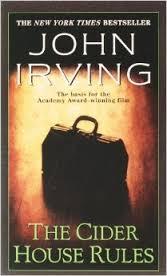
To his protégé, who did not approve of abortion, Dr. Larch noted that "when absolutely helpless women tell me they simply can't have an abortion, that they simply must go through with having another - and yet another - orphan, I do not interfere. I do not even recommend. I deliver it." As an opponent of Dr. Larch's "interruptions," the protégé was "welcome to disapprove," but he was "not welcome to remain ignorant."
In later years, the tired doctor berates his abortion-averse protégé: "How can you feel free not to help women who are not free to get the help they need? Think about who is going to help them if you refuse."
The risks of being "of use" 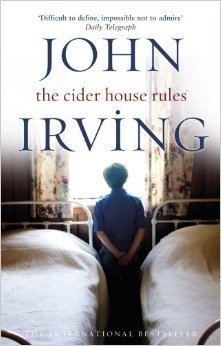
If, in his opinion, a pregnancy was too far along - if he felt he had to refuse an interruption - Dr. Larch could usually convince the woman she would have a safe delivery at St. Cloud's, where the child would be cared for lovingly by supremely dedicated nurses; and would have the best chance for adoption.
"We are put on this earth to be of use," was Dr. Larch's mantra.
From the 1920s into the 1950s, he hoped for "a better-informed world." Through all those decades, he never charged - whether for delivery of an orphan or for the delivery of a woman by performing an abortion. To be of use - by practicing compassion and producing relief - he risked fine, imprisonment, and the loss of his license to practice medicine.
What Dr. Larch saw, and tried to deal with
After a surgical internship at Mass General, he did an obstetrical residency at the South End Branch of Boston Lying-In Hospital. He was not fully prepared for what he saw and smelled in the city's poorer districts.
Squalor: In a seedy cold-water flat, on a street "littered with squashed fruit, tattered vegetables, and horse droppings," he was momentarily distracted by a cat toying with a dead mouse on the kitchen floor. "Larch wished he could sterilize the entire apartment." Months later, on a mission to save whomever he could from a backstreet butchery, he would encounter the same woman who had decided that she was unwilling to bring yet another child into her squalid turmoil.
Urogenital mutilations: So many of these inflictions were beyond repair. The reader is told of a particular abdomen, full of blood. "The hemorrhage issued from a six-inch rupture in the back of the uterus." Dr. Larch's stitches would not take; they pulled through the tissue which had "the texture of soft cheese - Muenster."
In the effort to save her, he found that "his fingers passed through her intestine as though it were made of gelatin." Desperate to spare herself yet another delivery, the woman had ingested a poison prior to the self-puncturing. The poison had turned her insides to mush.
There were other unspeakable insertions. They produced "the smell of sepsis and putrefaction so strong that he would gag if he breathed or swallowed." Dr. Larch held his breath and viewed "the fiery colors of her infection (even clouded by her discharge) which were dazzling enough to blind the intrepid as well as the untrained." He felt the heat against his eyes, "the young woman's inflamed tissue looked hot enough to burn the world."
Acute Peritonitis: These infections followed many backstreet abortions and puncturings.
Women whose stomach linings and abdominal organs were inflamed came to Dr. Larch in the hope of being saved. Left untreated, these infections spread to other organs, causing them to fail. So many were too far gone. If abortions were legal, these women wouldn't have had to resort to backstreet or self-inflicted butchery.
But abortions were not legal. Desperate and desperately sick women came to him "without a scrap of identification," but requiring sickening removals: "She'd brought only her burning infection, her overpowering discharge, her dead but unexpelled fetus (and several of the instruments she - or someone else - had put into her)." But even Dr. Larch's efforts were too late.
No choice: unplanned pregnancy, unplanned parenthood
While being careful not to draw attention to his relief work at St. Cloud's, Dr. Larch beseeched the White House to come to the aid of those dreading more childbirth.
In a 1940s letter to the Eleanor Roosevelt, John Irving has Dr. Larch ask for a national recognition and intervention: "The same people who profess their love of the unborn's soul - they don't care to offer much assistance to the unwanted or the oppressed! How do they justify such a concern for the fetus and such a lack of concern for unwanted and abused children? They condemn others for the accident of conception.... If you expect people to be responsible for their children, you have to give them the right to choose whether or not to have children."
In another 1940s letter, Dr. Larch appealed to President Roosevelt to "take pity" on the unplanned and unwanted: "Those who plead for the lives of the unborn should consider the lives of the living.... the unborn are not as wretched or as in need of our assistance as the born!"
In his private journals, Dr. Larch confided that "At St. Cloud's, we see many results of the rhythm method." To whomever would listen confidentially, he would explain that "the unwanted products of conception" would be avoided if, with the illusion of love, there was contraception.
June 7, 1965: Griswold v. Connecticut
All nine Justices of the United State Supreme Court criticized Connecticut laws which criminalized the use of contraceptives and counseling about contraception. Seven of the Justices specifically condemned the Connecticut law that allowed for the arrest, prosecution, and conviction of those who informed and advised married couples about contraception. No typo - married couples.
That June 7, 1965 vote holding Connecticut's anti-contraception laws to be unconstitutional was 7 to 2.
In his dissent, Justice Black argued that the remedy for the law's "evil qualities" was within the state legislature's purview, not the Court's. He explained that his dissent should not be read as a finding that the laws were wise or based on good policy. "In order that there may be no room at all to doubt why I vote as I do, I feel constrained to add that the law is every bit as offensive to me as it is to my Brethren of the majority."
In his dissent, Justice Stewart agreed with Justice Black that recourse and remedy should be with the state legislature. Still, he opened his dissenting opinion with these disclaimers:
"Since 1879, Connecticut has had on its books a law which forbids the use of contraceptives by anyone. I think this is an uncommonly silly law. As a practical matter, the law is obviously unenforceable, except in the oblique context of the present case.
"As a philosophical matter, I believe the use of contraceptives in the relationship of marriage should be left to personal and private choice, based upon each individual's moral, ethical, and religious beliefs.
"As a matter of social policy, I think professional counsel about methods of birth control should be available to all, so that each individual's choice can be meaningfully made.
"But we are not asked in this case to say whether we think this law is unwise, or even asinine. We are asked to hold that it violates the United States Constitution. And that I cannot do."
While the two dissenting Justices found the laws unwise, they favored "judicial restraint" - deference to legislatures. Fortunately, the other seven Justices found that the proscriptive laws intruded upon the right of marital privacy.
Dr. Larch would applaud
Privately, he set down the origins of St. Cloud's. For decades and decades, he chronicled its commerce and failings; the lives of those who passed through and those who seemed incapable of moving on.
And as an historian, Dr. Larch would have marveled at the documents the Justices felt the need to summon and invoke so as to justify their finding of a right to privacy in "the penumbra of specific guarantees of the Constitution's Bills of Rights."
The writings of James Madison and other "Framers" were cited, along with dozens and dozens of cases, to underpin the finding that Connecticut's anti-contraception laws violated the Constitution's Due Process and Equal Protection guarantees.
For good measure, the seven Justices held that the First Amendment's right to freedom of speech had also been violated. They ruled that the First Amendment's safeguards include "not only the right to utter or to print, but the right to distribute, the right to receive, the right to read, along with the freedom of inquiry, the freedom of thought, and the freedom to teach."
Those First Amendment rights were asserted on behalf of Estelle Griswold, the Executive Director of the Planned Parenthood League of Connecticut and her co-defendant (and co-appellant) C. Lee Buxton, an eminent obstetrician-gynecologist and the Medical Director for the League at its center in New Haven. They had been arrested, prosecuted, and convicted of "aiding and abetting" married women who wanted to learn about and access medically-approved, safe, contraception.
2015: For those birthing presidential campaigns and those conceiving runs for legislative power and those lusting for criminal court judgeships, The Cider House Rules and Griswold v. Connecticut should be required reading.
In addition to being absorbing and moving, John Irving's accounts of 20th century plights tell us a lot about facts-of-life predicaments that are still with us. Irving has a nurse at St. Cloud's declare that making abortion illegal is "a sanctimonious form of violence against women." The Griswold decision should provide cautionary counsel to those with righteous delusions and moral hatreds.
For presidential hopefuls, the next 17 months will be pregnant with pop quizzes. Beginning next year, there will be highly-scrutinized thesis deliveries and dissertation defenses. Time for note-taking - there will be a final exam come November 2016.
